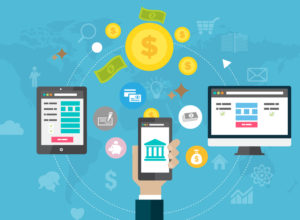Digitalization will make healthcare more efficient and cheaper
Today the state of multitrillion dollar healthcare worldwide is inefficient, bureaucratic and too expensive. But all this could change thanks to the implementation of exciting new technologies for digitalization of health.
The time has come for the healthcare industry to follow transport’s suit and to embrace disruptive innovators like Uber and Lyft, who used the full potential of mobile technology to revolutionize the taxi industry.
Thousands of startups, along with giants like Google, IBM, Apple, Samsung and many others are entering the new market for Digital Health and will totally transform the way people are treated today.
All this will lead to healthcare, which is much cheaper and effective, experts believe that in the next 10 years this will be the most transformed industry in the world. Part of the reason is the rise of IoE devices, which will give medics accurate and live information about our health status.
Wearables now monitor everything from blood sugar to blood pressure, medication, weight and levels of activity. According to recent research the medical device industry market, which totaled about $5.1 billion in 2015 will almost triple by the end of decade.
Better monitoring, including devices and home visits, can lower the need of hospitalization and lead to huge cost savings. The CVS Health Research Institute calculated that deployment of remote devices and using their data could save as much as $63 million per 100 000 patients with high cholesterol and diabetes.
Digital healthcare investment already has gone through several different waves. In 2013 the market was all about consumer wearables, in 2014 we saw the rise of healthcare big data. 2015 was the year of virtual care delivery and in 2016 we saw some development in payer disruption.
But this year we can expect a return to developing technology that enables providers of health services to extend their reach and take greater risks.
Recently the World Health Organization (WHO) announced the forming of an expert committee, that will create guidelines for countries and implementers on how to use digital health strategies to improve reproductive health outcomes.
Disruption of the healthcare industry will require continued movement towards a more value-based model, which will help for improving of preventive medicine, patient-centered and patient-powered care and reduced costs.
If you want to keep up with the hottest trends in the world of digital health Webit.Festival is the right place for you. During the Health & Wellbeing Summit, you can listen to top level speakers such as the Consultant surgeon & Co-founder of Virtual Medics and Medical Realities prof. Shafi Ahmed. He is the first doctor who streamed a live operation using Google Glass to 14 000 students in 2014.
Private sector is driving the new age of space exploration
History of the human race is full of stories of amazing leaps, from migrating out of Africa to landing our spacecrafts on other planets and even asteroids. Nearly 50 years after first human steps on the Moon the space industry is completely different, than it was in the 20th century.
Contrary to perceptions, space industry is extremely traditional because of the high costs and need of minimal risk. But now private companies are beginning to take the initiative and to change our ideas about space as a place, reserved for government agencies.
There was a time when NASA and Roskosmos were the two main engines of our dreams for space exploration. But over the last 15 years that has changed with tens of space companies entering the market with serious plans for building rockets and colonizing new world.
Today almost everyone is aware of Virgin Galactic, SpaceX and Blue Origin, mostly due to the popularity of their celebrity entrepreneur owners. If their efforts for creating a reusable booster succeeds, this can lower the costs for space launch with as much as 60%.
And this is not even the whole picture. Hundreds of small startups have popped up for the new space race. Companies like Astrobotics are charging $1.2 million per kilo to take your stuff to the moon, while experts in Saber Aeronautics are using video game tech to help you create missions and operate satellites with minimum training.
During last year’s Webit.Festival in Sofia the project coordinator and engineer at European Space Agency (ESA) Lluc Diaz explained that because of the numerous private initiatives mankind is starting to look for the exploration of deep space.
In Europe, all this is happening not only with private capital, but through programs for public-private partnerships. Right now ESA is working with more than 400 startups, helping them with expert knowledge about implementation of space tech in our everyday life.
Great example of this kind of partnership is the success of companies like Planet Labs, that creates smaller and cheaper satellites that are easier to launch in space.
This year on Webit.Festival you can find out more about the future of space industry and exploration of the Universe from top level speakers, likе the Chairman of Breakthrough Prize Foundation Simon P. Worden.
The author of more than 150 scientific papers in astrophysics space sciences and strategic studies will talk about the search of life beyond the Earth and deep space traveling.
Big Data analytics is the next frontier for digital knowledge
After a landmark year, in which companies worldwide began to analyze databases of all forms and sizes we can expect systems supporting large volumes of structured and unstructured information to continue rising.
We know well that there is huge amount of valuable information in the corporate world, but there are few companies that are using its full potential. The data that your company already owns can show you a lot about the way your customers are thinking, what do they want and what they are thinking about your brand.
Market already demands platforms and services for data management and security. In the same time we are going to see a lot of tools, that empowers users to analyze that data.
Today Big Data is not something, that only enterprise use. In fact it is a game changer for every industry and is even messing in the political life. As Vice’s Motherboard reported, data analysis from social media is among the key factors for the victory of Donald Trump in the USA presidential elections.
Psychologist Michal Kosinski developed a method to analyze people based on their Facebook activity. Five years ago he proved that it is possible to predict user’s skin colour, sexual orientation, political affiliation, intelligence, religion and even alcohol use on the basis of just 68 “likes” in the social media.
This type of analytics can bring enormous benefits for the business because it can be used not only for creation of psychological profiles, but also for searching them around the web.
Expert believe that in 2017 many small and midsize companies will form strategies for taking more of their applications to the cloud and out of the data centers. This will save them costs of investment in equipment and will lead them towards subscribing to services.
Moving data analytics to the cloud will accelerate the process of turning your data into action.
Big Data will help businesses to precisely predict future behaviors and events and improve their profits. This will be a key factor for minimizing revenue risk exposure and improving of operational effectiveness.
If you want to keep up with the hottest trends in the world of data usage and analytics Webit.Festival is the right place for you. During the Big Data & Cloud Summit, you can listen to top level speakers such as the VP for Cloud and Mobile Technology Strategy at IBM Jonas Jacobi and the CTO of Intel Security for EMEA region Raj Samani.
European tech startups are on the rise
Despite fears of Brexit disruption, 2016 was really a roller coaster year for European startups. According to French investment advisors Clipperton, EU startups have collected $12 billion of investments for the year, which is comparable to the record levels of 2015 for investment on the continent.
It is still too soon to measure the impact of Britain’s decision on the startup market, but the dynamics of the two-year process of leaving the EU will have to be monitored closely.
Experts believe that this year there will be several main engines for startup development in the tech sector. During 2016, big corporations invested lots of money in better predictions with Artificial Intelligence and Machine Learning.
In 2017 we can expect a lot smaller companies to take part in the AI revolution. Part of this is due to the fact that many universities started classes to educate students about the possibilities of this exciting new tech.
Gartner already identified AI and machine learning as one of the top 10 strategic tech trends, that expands the spectrum of implementations to physical devices, apps and services.
With the development of AI there is a lot of room for growth for startups, that specialize in chatbots. Business will look for bots more often than ever to help reduce its spending on customer service. Chatbots will be hot in the years to come, just because there are great way for corporate optimization.
More than 85 percent of customer interactions will not include a human being by 2020, and chatbots will be the No. 1 consumer application of AI during the next five years.
Another generator of startups is the cybersecurity sector. Insiders say that after every hackaton in the developed world, a new cybersecurity startup pops up to address the problem. This field is full of opportunities for new companies to step in, and we all expect the number of threats online to continue to rise.
According to a report by Frost and Sullivan the implementation of blockchain technology can put an end to cyber attack. Until now many thought that blockchain has only the potential to fuel innovation in FinTech sector.
European startups are really on the rise with the help of many accelerators and events like Webit.Festival Europe. During this year’s Founders Games an international board and jury of investors and enterprise leaders are selecting semi finalists from over 1500 applications. Five of them will get to the finals and one will win a seed investment. Last year the award was €200 000, but this year the organizers hope it will reach €500 000.
With over 93% startup failure overall rate, the selected Webit startups for the Founders Games’s semi-finals in the past 7 years have less than 30% failure rate. Being among the Webit's Founders Games startup list is a statement of the company's credibility, innovation and potential in front of enterprise and investors as well as a great marketing opportunity.
Webit gives startups access to a community of over 100 000, including some of the most influential people on 5 continents. The festival consists of 12 parallel summits - a fact that gives the unique opportunity for targeted networking with some of the best in the industry.
How can we make money from Open Source software
In recent decades globalization unfolded as a process that has brought huge positives for the freedom of trade, travel and cultural exchange in the world. But in terms of informational technology the main part of its success is reflected in the development of Open Source software.
Until recently, many people thought that the use of open source is something unique to non-profit organizations. But major companies, including Oracle and Google, support this kind of software too.
According to industry estimates, more than 180 young companies that give away their software, raised roughly $3.2 billion in financing from 2011 to 2014. This is amazing shift from the time when ex-Microsoft CEO Steve Ballmer called Linux a cancerous operating system.
Here are some of the top business models for profiting from open source:
Redistributing Open Source Code
Perhaps the most popular way to make money from the open source is to take free code, that is written elsewhere and to try to sell it in value-added form.
But the fact your company is not the only one, that is developing the software, makes it harder to sell to the customers.
Companies paying for Open Source programming
It is hard to believe, but there are many companies paying developers to create open source software platforms. Some of the biggest among them are Red Hat, IBM, Novell and Linux Foundation. And there are many other distributors of Linux that want to upgrade and patch the already existing software.
Freemium model
This model is based on the idea of building an open source product and allowing free use of the code, but not for enterprise and value-added products. Freemium is simple and straightforward, but many are criticizing it for pushing users toward the enterprise editions of the free versions.
Selling Service
The financial return of costs on open-source software can also come from selling services, such as training, technical support, or consulting, rather than the software itself.
Another possibility is offering open-source software in source code form only, while providing executable binaries to paying customers only, offering the commercial service of compiling and packaging of the software.
If you want to keep up with the hottest trends in the world of software development Webit.Festival is the right place for you. During the Dev Summit, you can listen to top level speakers such as the Founder and CTO of Maria DB Foundation Michael “Monty” Widenius, the Developer Advocate at Google Don Dodge, and the Developer Evangelist at Amazon Peter Heinrich.
Finding the right balance between privacy and security online
The era of omnipresent Internet is said to bring 24 billion IoT devices, as well as $1 trillion spent on cyber security from 2017 to 2021.
As we take a look at what happens in the global landscape, we can clearly see that what matters the most, is information. What is the most expensive, and not just in terms of business, is data. It’s no surprise, then, that preventing the stealth and uncontrolled usage of those plays uprising role in the era.
Experts predict that this year we will see huge leaps in terms of cyber security. Within the next years, companies will more and more rely on software solutions, ensuring automation of privacy. Also, business decisions will be more informed and backed on freely accessible, but accurate and protected data. Realizing the importance of data protection, global regulatory bodies promised a new privacy regulation to be developed and implemented in 2017, too.
The world may spend undisclosed amount of money on things that just don’t matter, but cyber security isn’t one in that row. And while business solutions are much more expertise and any other sources requiring, individual decisions are much easier to start with. If you could be your own cyber security advisor, what would you do to make secure yourself, as an individual first?
Basic rules you could follow to make sure you’re cyber-protected, are to use different email accounts for usual communication and for sensitive information, to not click on any flashing links of suspicious emails in your inbox, to choose wisely the passwords you use, to make sure the kids use different computer to download games, to watch out what you download and open on your smartphone.
When talking about cyber security, a key fact we all need to understand sooner or later, is that personal data is the price we pay for enjoying a huge amount of internet and mobile features. Underestimating its value and giving it away, knowingly or not, is definitely not the best thing you can do for yourself.
Would you let this app to access your location, files, Wi-Fi connection and calls log? To access this website, you should first read and accept the terms and conditions. We know you want to keep it, but would you share your privacy with us by just clicking here?
This is a small part of the questions you’ll be asked in order to register on a website or a mobile app. And most of us would instantly respond “Yes” without even reading. The privacy policies of the websites explain how gathered data will be used - selling, targeting, development of new tools and apps. But truth is, no one reads them carefully, as the websites usually want us to do.
In our connected world, conscientious and strategic steps to ensure cyber security are needed both by customers and by businesses. While for most of the companies IT departments were in charge of it so far, cyber security is a matter of business, not of IT solutions.
To learn more on the topic of cyber security and privacy, visit the Security & Privacy Summit within Webit.Festival Europe. During 25 and 26th April 2017 in Sofia top level speakers from all over the world will share their experience. You can listen to Ulrich Seldeslachts, CEO of LSEC-Leaders In Security; Raj Samani, CTO EMEA of Intel Security and Rami Essaid, Co-Founder of Distil Network.
Chat bots are taking over the online advertising
During the last few years we have witnessed incredible growth and transformation in the digital advertising industry, which were driven mainly from the expansion of mobile tech and the new types of wearable devices on the market.
According to 2016 internet advertising revenue report digital video has generated the greatest gain of any format across desktop and mobile. The revenues continue to go up, despite the mass adoption of apps and programs for ad blocking.
Many experts predict that the industry will be driven forward by the need to deliver better and fewer ads to the customer.
Most of them believe that 2017 will be the year that messaging services will take the lead. The reason for that is the rise of chat bots, who are attracting more and more budgets.
But new types of bots are bringing some risks along with the value they add. Machines that create fake clicks and views can also steal information for our credit cards. This will put additional pressure on the cyber security and privacy experts, who will have to find out new ways to protect us from ad frauds and detect the toxic bots.
Right now about 60% of Google’s net global ad revenue comes from mobile, up from about 45.8 percent in 2015. The company expects that by 2018 almost 75% of its ad revenues worldwide will come from mobile ad placements.
The development of messaging apps like Facebook’s Messenger and WhatsApp is proving that customers want a more direct and private communication. We can expect to see entirely new options for paid content.
The global practice chairman of Edelman Digital Kevin King predicts that the billions of daily users in the messaging platforms will enable marketers to make the best of new engagement opportunities. He is sure that these conversational experiences will combine past revolutions in e-commerce and text services, while in the highlighting the potential of AI.
Meanwhile, the mass production of VR and AR devices will bring significant improvement in software and will increase brand efforts to penetrate this new market.
If you want to keep up with the hottest trends in the world of marketing Webit.Festival is the right place for you. During the Marketing & Innovation Summit, you can listen to top level speakers such as the Global Editorial Director of Wall Street Journal Custom Studios Fara Warner, the President and Global Brand Director of Havas Worldwide Jason Jercinovic and the Head of CMO practice of Forbes Media Bruce Rogers.
5 disruptive tech trends to watch in 2017
We are living in increasingly digital world, but there are several emerging technologies, that will probably be a catalyst for long-term innovation. In 2016 tech like AI, VR, AR, Chatbots and automated cars took major leaps in terms of their adoption and we can certainly say that robots are no longer coming, because they are already here.
In the age of digital transformation disruption has become the key word for innovative businesses. And now almost every industry from transport to finance is facing big changes through technology.
This year we can expect more connectivity, more automation and more significant impact of technology in investment and business than ever before. Here are the 5 most important technological trends that everyone must watch for:
Artificial Intelligence (AI)
Artificial intelligence is already a part of journalism, healthcare and even customer support with the rise of chat bots. Many expert believe that 2017 will be the year we embrace the cultural shift and start trusting AI with more and more jobs, that were previously done manually.
Facebook CEO Mark Zuckerberg showed us the best of smart homes innovation with his house virtual assistant, but there is still a lot to come. Gartner defined AI and machine learning as the two most disruptive trends of the year.
Virtual Reality (VR)
This year virtual reality is finally breaking the limits of digital entertainment and gaming sectors and is going out in the mainstream. The two spheres, that are most likely to benefit from the invasion of VR are Education and Healthcare. But soon the next reality will be found in nearly every aspect of our lives.
Now it’s up to the business to find out how virtual reality can add value to its marketing, customization of products and much better customer experience.
Immersive experiences with AR and VR are reaching tipping points in terms of price and capability but will not replace other interface models.
3D Printing
Although 3D printing can hardly be defined as a new technology, the real advances in this field came during the last 5 years. 3D printing is going to disrupt manufacturing, e-commerce and retail, not only with new method for mass production, but with ways for personalization.
Meanwhile, the idea for Tesla’s smart factories, in which machines are building machines, are just a step towards the concept of self-replication robotics, drones and home systems.
Digital Identification & Biometrics
With the coming age of IoE we are quickly moving to a time, where our personal information will all be stored biometrically. This process has already started with fingerprint sensors on our phones, but soon the biometric identification will spread to face recognition and iris scans.
This year will mark the beginning of ”digital twin” representation. This innovation will allow analysis and simulation of real world conditions and improving of operations using data on how the components of a device operate end respond to environment.
Automated vehicles
The era of automated vehicles is just around the corner. It will affect not only the sector of transportation, but also the labour market, city traffic and air quality and even the way we spend our free time.
The driverless cars will offer numerous social benefits, such as better personal mobility, decline in the number of injuries and fatalities and increased productivity, due to the time freed up while traveling.
Although we can’t expect a fully autonomous car this year, we will see more and more companies present their concepts about their future models, where the driving is not the focal point of the user experience.
In the next few years we will see self-driving taxi services, provided by companies like NuTonomy, Uber and Lyft, while automation giants, such as Ford, BMW and Toyota will continue their work on providing the best product for this new market niche.
You can learn more about the newest trends in technology sector by attending to Webit.Festival Europe. During the two-day agenda of the festival in Sofia you can listen to top level speakers from all over the world, who will share their experience on topics, such as Marketing & Innovation, FinTech & Blockchain, Big Data & Cloud, IoE, Digital Transformation, Security & Privacy, Health & Wellbeing and Mobility.
FinTech is going mainstream with help from Silicon Valley
Despite of having the lion share of the world’s money, financial markets are among the most conservative fields of business and are usually focusing more on the results than on development and deployment of innovative solutions.
But the fast spread of disruptive companies like Robinhood, which allows free stock trading, has made 2016 really amazing for the FinTech industry and led to its moving into the mainstream.
Just five years ago FinTech was not something that most people would invest in, but now, it has become one of the hottest industries in the startup world. Why? Just because it gives the chance for a new company to offer services and compete with the big banks.
Let’s just think about how easier it has become to make a bank transaction online than it was few years ago. Now every big financial institution is obliged to incorporate online banking in its platform to be competitive on the market.
The internet platforms for crowd-funding are just another example of how FinTech has made our lives better and has empowered people to invest in projects on the other side of the globe. This type of technology continues to dramatically change the landscape for several spheres and the process is not going to slow down in the near future.
Experts predict that in 2017 we are going to see credit and debit cards becoming more and more useless in the developed world, where cash is quickly giving way to phone financial transactions.
The CEO of Vena Solutions Don Mal says that now having a smartphone in your pocket is much more important than your physical wallet. His expectation is that in the next five years the market for contactless cards will double and most of the retailers will accept mobile wallets.
Meanwhile the biometric sensors on our phones will work not only for the HealthTech industry, but also for better payment security. In the near future we will see an multistep process for verification, which may include fingerprints, iris scans and facial recognition.
Of course the better financial technologies will benefit not only the rich. In fact, they can be even more important for people in developing countries. In Kenya the system, that locals call “mobile money”, allows those without access to bank accounts to deposit, withdraw, and transfer cash with a simple SMS.
According to Science Magazine’s study the access to M-PESA, the country’s most popular mobile money system, lifted hundreds of thousands of Kenyans above the poverty line. The network was introduced in the country in 2007 by Kenya’s largest mobile service provider - Safaricom. It is now used by at least one person in 96% of Kenyan households.
You can learn more about the newest trends in FinTech and Blockchain sector by attending to Webit.Festival 2017. During the two-day agenda of the festival in Sofia you can listen to top level speakers from all over the world, who will share their experience on topics, such as Marketing & Innovation, Big Data & Cloud, IoE, Digital Transformation, Security & Privacy, Health & Wellbeing and Mobility.
Among them will be the Executive VP for Global product strategy of Wirecard Christian Von Hammel-Boten and the venture capital investor and CEO of Novus Ordo Capital Liliana Reasor.








